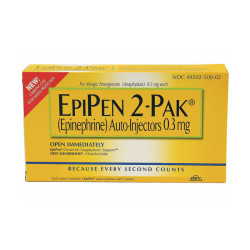Top Class Actions’s website and social media posts use affiliate links. If you make a purchase using such links, we may receive a commission, but it will not result in any additional charges to you. Please review our Affiliate Link Disclosure for more information.

The EpiPen is an important prescription medication that is used to treat people suffering from anaphylaxis, a life-threatening allergic reaction that causes a person’s airways to swell, affecting the person’s ability to breathe.
According to the EpiPen class action lawsuit, it costs about $20 to $30 for the components of an EpiPen. In addition, epinephrine has been widely available for more than a century.
However, since Mylan acquired the rights to market and distribute the EpiPen in 2007, it has reportedly increased the list prices for the drug 17 times. As a result of this pricing, the list price of EpiPen has increased from $90.28 to $608.62.
“Mylan’s price increases for EpiPen have been so dramatic that some patients have resorted to carrying expired EpiPens, or using syringes to manually inject epinephrine,” the EpiPen class action lawsuit asserts.
Plaintiffs Amber Rainey, Christina Kollmeyer and Lisa Vogel filed the EpiPen class action lawsuit this week in Washington federal court, claiming that they all overpaid for EpiPen as a result of Mylan’s pricing scheme.
The plaintiffs allege that the price of the EpiPen skyrocketed because Mylan pays pharmacy benefit managers (PBMs), which negotiate prices with drug makers on behalf of health plans.
According to the EpiPen pricing class action lawsuit, the three biggest PBMs are Express Scripts, CVS Health and OptumRx. These PBMs reportedly make around $200 billion in revenue each year and control more than 80 percent of the PBM market.
The plaintiffs claim that these PBMs set up a tiered system for health insurers, based in part on the prices they are able to secure for the drugs. “Preferred” brand drugs are generally placed into tiers that require a lower co-payment from a patient than non-preferred brand-drugs. This system encourages patients to choose the preferred drugs over alternatives.
The PBMs also sometimes exclude certain drugs from its tiered system so that health insurers will not reimburse members who purchase those drugs, the Mylan class action lawsuit states.
“As a result, PBMs have enormous control over drug purchasing behavior because they can push patients toward certain brand drugs over others,” the EpiPen class action lawsuit alleges.
The plaintiffs assert that drug companies set the list prices for brand drugs at a high cost so that they can offer substantial “rebates” to PBMs, which get paid in part based on the difference between the list price set by drug companies and the actual price paid by the PBMs.
“Thus, while in a competitive world competition would drive drug manufacturers to lower their prices, because high list prices benefit both drug manufacturers and PBMs, in the world of branded prescription drugs, the opposite occurs,” the EpiPen class action lawsuit states.
The rebates offered to PBMs are reportedly not disclosed by drug companies or the PBMs and are labeled as trade secrets. The plaintiffs allege that the companies fail to disclose the amount of rebates offered in order to hide the fact that the list prices have nothing to do with supply or demand of the drug. As a result, consumers were unaware that the skyrocketing cost of EpiPen was due to the PBM rebate payments until 2016, when there was public outcry about the drastic increase in EpiPen pricing.
According to the EpiPen class action lawsuit, Mylan representatives tried to paint the company as a victim of the system. However, the plaintiffs disagree and maintain that the company could have notified regulators or refused to participate in the scheme.
The EpiPen class action lawsuit asserts claims under the Racketeer Influenced and Corrupt Organizations Act and consumer protection laws under several states. The plaintiffs seek to represent a nationwide Class of consumers who have purchased EpiPens.
In October 2016, Mylan reportedly reached a settlement for $465 million with the U.S. Department of Justice over EpiPen pricing. A separate EpiPen pricing class action lawsuit was filed in Kansas in December 2016.
The plaintiffs are represented by Steve W. Berman and Jennifer Fountain Connolly of Hagens Berman Sobol Shapiro LLP and Craig L. Briskin of Mehri & Skalet PLLC.
The EpiPen Pricing Class Action Lawsuit is Amber Rainey, et al. v. Mylan Specialty LP, Case No. 3:17-cv-05244, in the U.S. District Court for the Western District of Washington, Seattle.
ATTORNEY ADVERTISING
Top Class Actions is a Proud Member of the American Bar Association
LEGAL INFORMATION IS NOT LEGAL ADVICE
Top Class Actions Legal Statement
©2008 – 2024 Top Class Actions® LLC
Various Trademarks held by their respective owners
This website is not intended for viewing or usage by European Union citizens.















94 thoughts onEpiPen Class Action Says Mylan Engaged in Anticompetitive Pricing Scheme
Please include me
Where does a person ho to sign up for this class action suit. I have to carry epi pen all the time.
How do I file to be a part of this settlement. I have to have the epipen due to severe reaction to bee stings. Within 20 minutes can no longer breath on my own.
My 6th grader came home and said my nurse at school said my epipen expires next month. So when it went up I would just call an ambulance .
I carry this with me due to several severe allergies a few yes ago I was unemployed due to closure of hospital I worked at due to the outrageous price I could not afford to purchase one at the time. All because the pharmaceutical company wanted to get higher profit
It is inhuman to have a drug that is needed by so many, and has been available as long as it has, to be increased in price like this! It is totale greed and nothing more. Until we have laws stopping this from happening, it will continue. Remember people, pharmaceutical companies are NOT in this to help anyone. They are in it to make money!!! And they don’t care how many die.
This is cruel to those of us that depend on these. I can’t afford my prescriptions now and am not filling them for my everyday meds. There is no way I can afford this. I will use the expired ones before I will pay the price for another one.
I think it’s a bunch of bullcrap I have bout so many epipens for my son who has a peanut allergy so when the price went up and insurance companies refused to pay of course he had to go without which I did buy one hoping to make it last but then it expired and had to throw it away
I have a epipen for my five year old son his skin broke out and it don’t help him.
Yes i agree the deaths that could be saved im emotionally drained